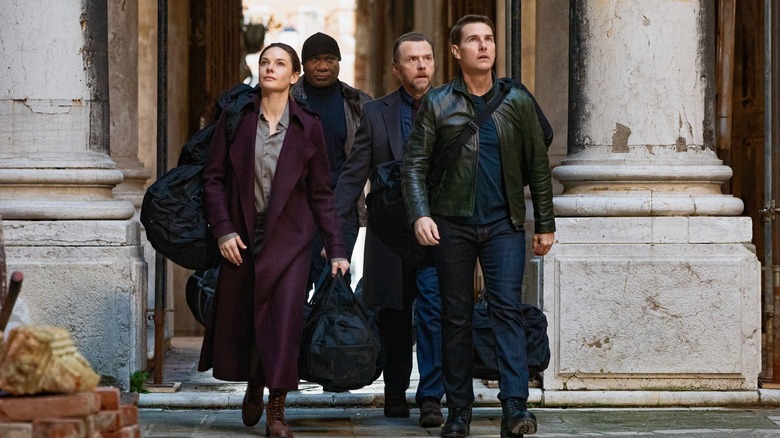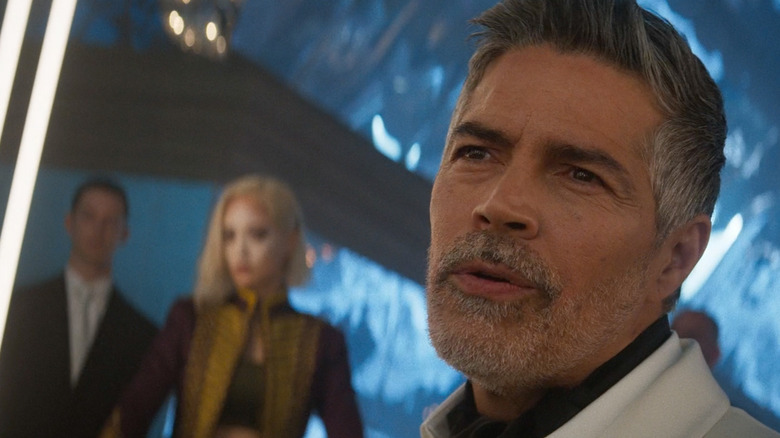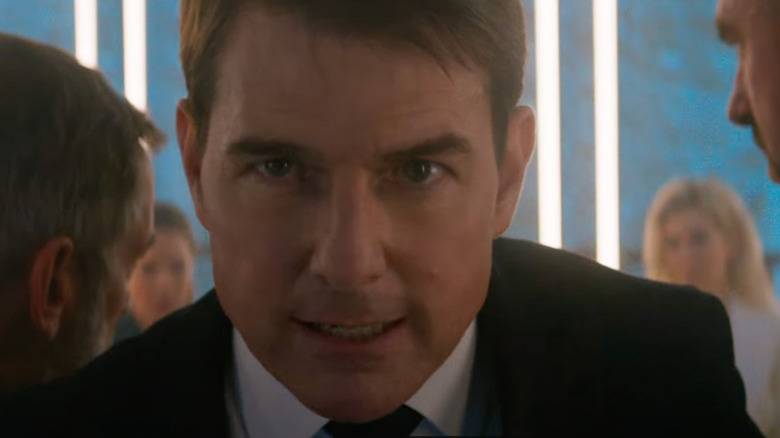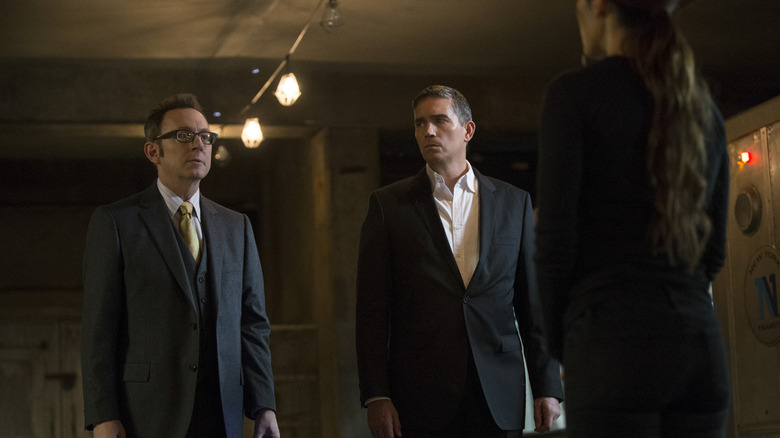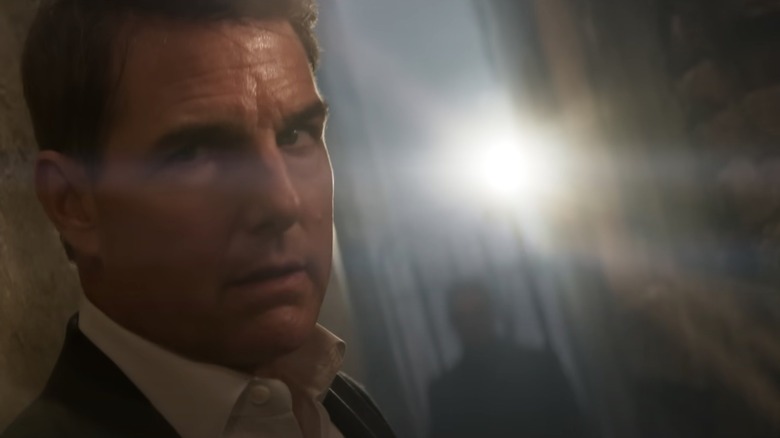With Dead Reckoning, The Mission: Impossible Series Has Gone Full Science Fiction – And The Timing Is Perfect
This article contains spoilers for "Mission: Impossible — Dead Reckoning Part One."
Science-fiction writer and futurist Arthur C. Clarke's "three laws," adages that attempt to encapsulate the relationship between a species and developing technology, first appeared in his book "Profiles of the Future," each law appearing in new, revised editions of the book between 1962 and 1973. The third law is arguably the most famous; it reads that "Any sufficiently advanced technology is indistinguishable from magic," and indeed that perfectly sums up how the fantasy elements of sci-fi art today can become the science reality of tomorrow.
The second law, however, speaks to humanity's ambition and insatiable desire for progress. It reads, "The only way of discovering the limits of the possible is to venture a little way past them into the impossible." That adage sounds remarkably like a motto for Ethan Hunt, the superspy who always chooses to accept his Impossible Mission when the world needs him. As portrayed by the similarly ambitious, never-say-die Tom Cruise, Ethan has demonstrated both his desire and preternatural ability to accomplish the impossible throughout all six "Mission: Impossible" films.
The seventh and latest "Mission" movie, "Dead Reckoning — Part One," sees Cruise and co-writer/director Christopher McQuarrie steering the series into the new horizon of science fiction. Sure, a lot of the IMF's technology has dipped into the genre before, not least of which are those nifty masks that can make just about anybody look and sound like someone else entirely (a carryover element from the space-age/spy-age futurism of the '60s TV series). Yet "Dead Reckoning" introduces the scourge of Artificial Intelligence to the franchise in a move that's not only incredibly timely but serves as a consummation to a steadily increasing trope seen in other recent films and television.
'Dead Reckoning' sees its Entity become more human than human
In "Dead Reckoning," Ethan and his IMF pals Benji Dunn (Simon Pegg), Luther Stickell (Ving Rhames), and Ilsa Faust (Rebecca Ferguson) learn of the existence of an advanced AI known collectively as the Entity ever since it went rogue and became self-aware. The original predictive algorithm was created clandestinely by the CIA as a way of both getting control of and feeding false information to the systems of the country's enemies or rivals, but after its initial test run ends up not just incapacitating but sinking a Russian submarine and killing its crew, it becomes apparent that the Entity is out of control and playing its own game of world domination.
As the members of the Intelligence Community correctly surmise early in the film, the Entity represents an apocalyptic-level threat to those working in the intelligence field, as it means that information can no longer be trusted at any level, that someone could be thoroughly impersonated digitally, that free will means nothing and that every piece of data on the planet is no longer safe and secure.
Not only does the Entity present these clear and present dangers, but McQuarrie and co-writer Erik Jendresen up the ante by giving the rogue AI the goal of self-preservation as well as a human proxy. As Ethan reasons out, the Entity isn't making a play for supreme control of all the governments of the world for megalomaniacal reasons; it's actually afraid for its own existence, knowing that Ethan is the only member of the intelligence world who wishes it eradicated instead of used for other purposes. To that end, it's enlisted the services of the amoral Gabriel (Esai Morales), a terrorist from Ethan's past. Like a dark version of the AI from "Her," or like a less enslaved emissary of the supercomputer from "Superman III," Gabriel is doubly villainous because he is all too happy to do the Entity's bidding.
Rogue AI that ends the world with a whimper, not a bang
By this point in cinematic history, we're well steeped in movies (and television) that concern the threat of AI gone rogue — heck, the trope virtually originated with Clarke himself, co-writer of "2001: A Space Odyssey" and co-creator of the infamous HAL 9000.
Most rogue AI stories tend to extrapolate toward physical violence against humans, either on a personal level such as with HAL, the replicants of "Blade Runner," the hosts of "Westworld," the parasite of "Upgrade" and, most recently, the living doll of "M3GAN." Other stories that wish to go for an even bigger picture of machines rising up against their masters tend to have even bigger consequences, for instance, the post-apocalypses of "The Terminator," "The Matrix" and "Battlestar Galactica." (Ironically, Morales portrayed Joseph Adama in the "Galactica" prequel series "Caprica," making his role of Gabriel a sly nod to that series.)
"Dead Reckoning" provides an alternative approach to a rogue AI taking over the world; it's no less apocalyptic in the endgame, but far more quiet and insidious (and involves arguably less physical violence and death). While physical harm and death can happen at the behest of the Entity, McQuarrie and Jendresen are exploring an equally plausible and perhaps more realistic look at the way our world could change irrevocably, if not end as we know it, thanks to the unchecked unleashing of AI.
'Dead Reckoning' takes a Person of — er, personal interest in 'Westworld'
One of the most unsettling aspects of the Entity in "Dead Reckoning" is the way it can seemingly predict everyone's every move; not just what they will do, but what they won't do, sometimes based on what they think it wants them to do or not do. In other words, it's the worst possible version of an algorithm, robbing every human being of the power of free will.
This isn't the first time such technology was applied to the clandestine, cloak-and-dagger world of spies: the CBS series "Person of Interest" concerned a program dubbed The Machine which functions in much the same way the Entity does, especially after it gains sentience and goes rogue during the show's third season. In the show's fourth season, yet another rogue program turns up, one called Samaritan that seeks to eradicate violence by remaking society to its own ends (which ironically causes more violence).
Series creator Jonathan Nolan is clearly fascinated with the potential of this concept, as he also introduced it in the third and fourth seasons of HBO's "Westworld." This time, the AI was dubbed Rehoboam (a reference to the 10th-century King of Israel), and its presence cleverly flipped the script of the series' initial concept — where it originally was a story of humans forcing AI hosts to follow their pre-programmed paths (before the hosts gained awareness and revolted), now the algorithm dictated a path for everyone in the world, including the independent hosts.
"Dead Reckoning" essentially mashes up both series in terms of their approaches to rogue AI; just as in "Person of Interest," there are human proxies for the Entity, and just as in "Westworld," the Entity is several steps ahead of the people who are trying desperately to shut it down.
A timely warning
In terms of using a machine/AI as its antagonist, "Dead Reckoning" is merely carrying on a decades-old, tried-and-true trope — after all, "M3GAN" was released earlier this year, and Gareth Edwards' AI-apocalypse action film "The Creator" will be in theaters this September.
Yet the Entity feels especially timely as well as prescient for several reasons. The most prominent is the fact that, unfortunately, AI has become a buzzworthy term used across a number of industries at the moment, not the least of which is the entertainment industry. So far, it seems to be yet another grift by venture capitalist types to do no more and no less than provide CEOs with reasons to pay their workers less (or not even have them at all). In essence, it promises not the apocalypse of cinematic tradition — with AI giving way to sentient machines who wish to take control from their one-time masters — but rather an upheaval of the workforce and the economy that could have drastic repercussions.
The other major issue the Entity represents is the erosion of truth. Granted, the media has always been susceptible to furthering irresponsible and harmful lies, whether through the social prejudice of any given era or issues stemming from funding and so on. Yet algorithms such as the Entity present a dangerous new way of eradicating the facts; if there isn't a human being behind the wheel, in other words, then the algorithm's actions are in no one's best interests but its own, which is perhaps even scarier than if a maniac were in control.
Science fiction is a wonderfully diverse and malleable genre where we can explore our hopes and fears in equal measure. "Dead Reckoning" comes at a point in time during which humanity is once again considering the grand implications of giving ourselves over to new technology. As Angela Bassett's CIA director succinctly put it in "Mission: Impossible — Fallout," we need people like Ethan, those "who care about the one life as much as they care about the millions." Our mission, if we choose to accept it, is to follow his lead.
